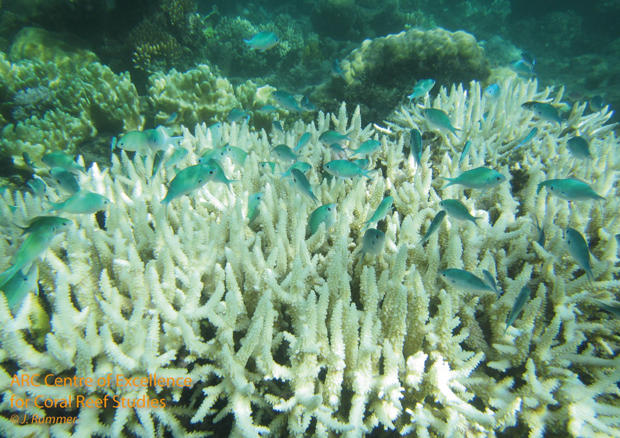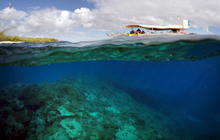Great Barrier Reef coral bleaching hits "extreme level"

Bleached staghorn coral with damselfish in Australia's Great Barrier Reef.
J.RUMMER/ARC CENTRE OF EXCELLENCE FOR CORAL REEF STUDIES
Coral bleaching -- a phenomenon that can result in the widespread die-off of coral life -- is a serious problem facing the world's oceans, and according to a new aerial survey of Australia's Great Barrier Reef, 95 percent of the reef's northern section is now bleached, Australian Broadcasting Corporation reports.
The aerial survey, conducted by researchers from the ARC Centre of Excellence for Coral Reef Studies at James Cook University in Townsville, Australia, came after researchers found unprecedented levels of bleaching from extensive underwater studies of the reef.
One of the researchers, Jodie Rummer, returned from more than a month spent at the Lizard Island Research Station in the northern part of the reef and said she was shocked by what she saw.

26 PHOTOS
The deteriorating Great Barrier Reef
"I witnessed a sight underwater that no marine biologist, and no person with a love and appreciation for the natural world for that matter, wants to see," Rummer said in a university press release.
She had been conducting research on the island since January 2012.
"The bleaching now is not just restricted to the hard corals," she said. "There's also extensive bleaching in the soft corals, and it is also affecting anemones and giant clams."
What exactly is coral bleaching? It occurs when unusual environmental conditions, like increased sea temperatures, result in corals expelling small photosynthetic algae -- zooxanthellae -- which normally provide oxygen and nutrients. The loss leaves the corals to turn white. The corals are able to recover if temperatures drop and the structures can then be re-settled by zooxanthellae. But otherwise the corals will die.
It is one of the more visible, worrying results of climate change on the world's oceans.
Terry Hughes, who led the study, told the broadcasting company "it is too early" to determine how many of the bleached corals observed in the aerial survey will die, but he didn't sound optimistic.
"Judging from the extreme level even the most robust corals are snow white," he said. "I'd expect to see about half of those corals die in the coming month or so."

Bleached staghorn coral with damselfish in Australia's Great Barrier Reef.
J.RUMMER/ARC CENTRE OF EXCELLENCE FOR CORAL REEF STUDIES
Coral bleaching -- a phenomenon that can result in the widespread die-off of coral life -- is a serious problem facing the world's oceans, and according to a new aerial survey of Australia's Great Barrier Reef, 95 percent of the reef's northern section is now bleached, Australian Broadcasting Corporation reports.
The aerial survey, conducted by researchers from the ARC Centre of Excellence for Coral Reef Studies at James Cook University in Townsville, Australia, came after researchers found unprecedented levels of bleaching from extensive underwater studies of the reef.
One of the researchers, Jodie Rummer, returned from more than a month spent at the Lizard Island Research Station in the northern part of the reef and said she was shocked by what she saw.

26 PHOTOS
The deteriorating Great Barrier Reef
"I witnessed a sight underwater that no marine biologist, and no person with a love and appreciation for the natural world for that matter, wants to see," Rummer said in a university press release.
She had been conducting research on the island since January 2012.
"The bleaching now is not just restricted to the hard corals," she said. "There's also extensive bleaching in the soft corals, and it is also affecting anemones and giant clams."
What exactly is coral bleaching? It occurs when unusual environmental conditions, like increased sea temperatures, result in corals expelling small photosynthetic algae -- zooxanthellae -- which normally provide oxygen and nutrients. The loss leaves the corals to turn white. The corals are able to recover if temperatures drop and the structures can then be re-settled by zooxanthellae. But otherwise the corals will die.
It is one of the more visible, worrying results of climate change on the world's oceans.
Terry Hughes, who led the study, told the broadcasting company "it is too early" to determine how many of the bleached corals observed in the aerial survey will die, but he didn't sound optimistic.
"Judging from the extreme level even the most robust corals are snow white," he said. "I'd expect to see about half of those corals die in the coming month or so."



